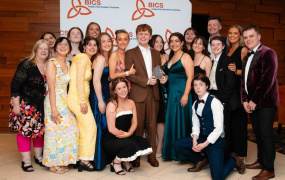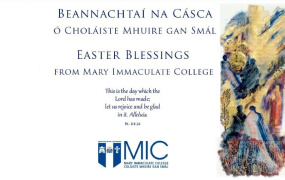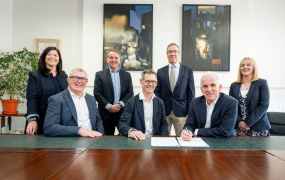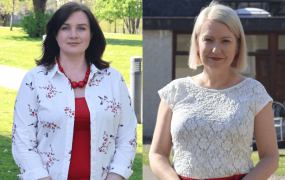Search
Use search box below to look for information on the Mary Immaculate College website. There are some helpful links to common search queries above it. Keep an eye out for the 'Ask a Question' function on certain pages and sections where you can pose specific queries to MIC staff (and see previous questions and answers underneath the question box).
Drawing on her research, and on previously unpublished archive material found by her research partner, Dr Fergal Lenehan of the University of Jena, Dr Sabine Egger’s talk will open new insights into the fascinating life and work of a woman the Irish historian Damian Mac Con Uladh called the "GDR’s most prominent resident from Northern Ireland" – and into the new interest in her by Irish and British mainstream media.
Mary Immaculate College, Limerick welcomed over 350 delegates from Ireland and across the globe for the multidisciplinary American Conference for Irish Studies (ACIS) this week in a coup for MIC as the event only takes place outside the United States every four years.
Plenary speakers including Paul Lynch, the Booker Prize winning author for Prophet Song, will address attendees who will also enjoy 120+ parallel panels, nine book launches, a gala dinner and complementary cultural activities.
The theme of the event is 'Embracing Change, Navigating Uncertainty: Ireland and New Beginnings' and it is hoped ACIS will examine how academic disciplines in Irish Studies are looking to embrace the changes and how they are traversing paths towards new beginnings.
The EMPOWER programme for post-primary students, designed and developed by Mary Immaculate College (MIC) and The Technological University of the Shannon (TUS), will take place across two weeks, one in Limerick and one in Tipperary, this year between 7 June and 17 June.
Learn how the library at MIC has a wide collection of dictionaries and encyclopedias. Many of them are held in the Reference Area on the ground floor but some are shelved in the main library beside the relevant subject. Please note when using the library catalogue to search the different spellings of encyclopedia, encyclopaedia, encyclopedias, dictionaries will give different results.
EndNote is a bibliographic management tool. It allows you to create your own database of references which you can then search, edit and format automatically in different output styles for bibliographies. Endnote can also be used to connect directly to Library Catalogues including the MIC catalogue. MIC has a site licence for EndNote and all staff and students are permitted to install a copy of the software on college-owned machines. Downloading EndNote X9 can only be done on campus.
The BA in English Language and Literature (International) aims to foster critically aware and digitally-skilled graduates who are highly adept at creating and interpreting texts and content. The programme will enhance literary and professional knowledge of English by focusing on the core features of language and linguistics, as well as the core literary texts, genres and theories. Graduates will have expertise spanning the language system (vocabulary, grammar, phonology and discourse), digital analysis and content creation tools, as well as a thorough understanding of English literature across a range of eras, literary and cultural theories and genres.
The BA in English Language and Literature aims to foster critically aware and digitally-skilled graduates who are highly adept at creating and interpreting texts and content. The programme will enhance literary and professional knowledge of English by focusing on the core features of language and linguistics, as well as the core literary texts, genres and theories. Graduates will have expertise spanning the language system (vocabulary, grammar, phonology and discourse), digital analysis and content creation tools, as well as a thorough understanding of English literature across a range of eras, literary and cultural theories and genres.
Visit this page to learn how English can be taken as part of the MIC Arts Degree as a joint honours combination. English at MIC covers a wide range of topics including modern drama, 20th century literature, literary interpretation, neoclassical literature, Irish poetry & prose, romantic literature, Elizabethan-Jacobean theatre & literary modernism.
Welcome to the Department of English Language and Literature here at Mary Immaculate College. In deciding to study this subject, you are joining a community of teachers, academics, scholars and researchers who are publishing to an international standard in their chosen areas of the discipline.
If applicants come from a non-English speaking country, they are required to meet the minimum English language requirements to study at MIC. Learn more.
Discover Mary Immaculate College programmes that develop enterprise and entrepreneurial skills across all educational levels and the outreach initiatives that support this work.
Mary Immaculate College has a tradition of making connections with nearby communities. Discover how MIC achieves this through a variety of outreach initiatives and events—organised and led by staff, students and our Director of Enterprise and Community Engagement, Dr Maeve Liston.
The office of Enterprise and Community Engagement (E&CE) enables and connects the MIC community of staff and students with wider society through innovative partnerships that make a difference. These partnerships increase the range of campus facilities available for social, cultural and municipal engagement by our community. Inspire and empower future generations through our educational outreach work that is designed and delivered in collaboration with a variety of stakeholders. Working with and supporting communities on collaborative initiatives that make a significant educational, social and cultural impact in Limerick City, as well as regionally, nationally and internationally.
The newly established Business and Accounting Department at Mary Immaculate College (MIC) was formally launched by Minister for Enterprise, Tourism and Employment, Peter Burke TD on 25 March at MIC Thurles.
Minister Burke, in his address to over 100 attendees at the event, commented that with 5,000 students and close to 2,000 graduates per year, MIC was making a significant contribution to the region in terms of higher education, industry and research partnerships—all creating a boost to the economy and local communities.










